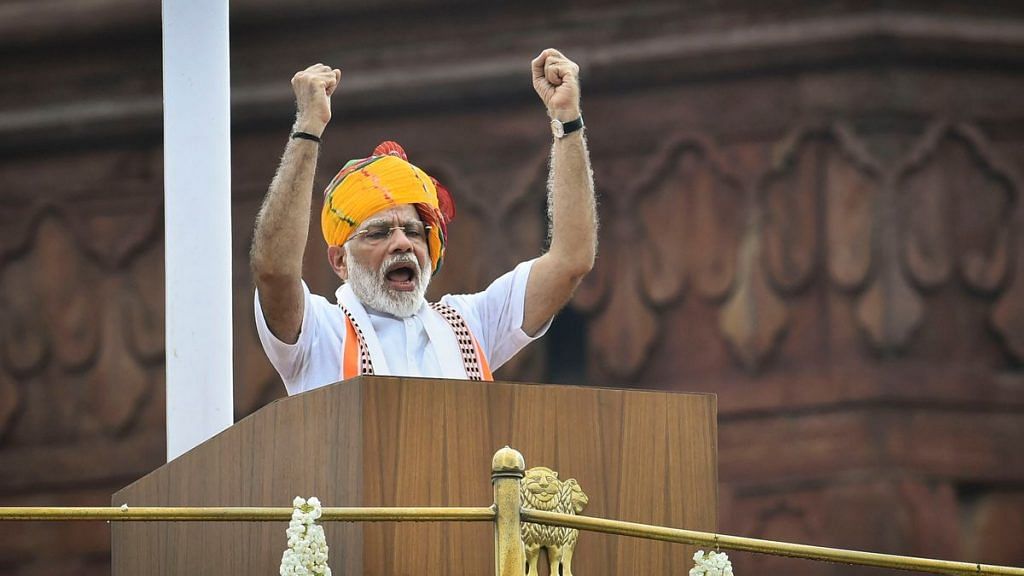Prime Minister Narendra Modi’s Independence Day speech was on the expected lines. While much of the speech was dedicated to his government’s recent move to abrogate Article 370, creating two Union Territories out of Jammu and Kashmir, and questioning his detractors, the most unexpected mention was about controlling India’s population. After the triple talaq law, is Modi’s ‘population explosion’ reference further proof that the BJP government is actively working towards fulfilling the Rashtriya Swayamsevak Sangh’s long-cherished dream – a Uniform Civil Code in India?
Before we turn to the crystal ball, a caveat first: it is not only difficult but almost impossible to guess the next move of PM Modi and Home Minister Amit Shah. There are two important indicators that suggest the Modi government could bring a Uniform Civil Code Bill in the next session of Parliament.
Also read: All lines on this route are closed: Getting my mother out of Kashmir in a lockdown
Keeping promises
PM Modi has clearly indicated that decades-old problems cannot be solved by procrastination, in a ‘fits and start approach’, or in instalments. Although he was referring to the abrogation of Article 370, this assertion could apply to any of the issues festering for over 70 years, including the long-standing demand of a certain section for the Uniform Civil Code (UCC). The inference that could be drawn here is that like the contentious issues of Article 370 and the Babri Masjid-Ram Janmabhoomi dispute, the time to deal with the UCC demand too has come.
Indicating that his second term will be equally action-packed (as was his first term with demonetisation, GST, and surgical strikes), PM Modi began explaining the idea of ‘one nation one Constitution’ and went on to list his government’s agenda for the next five years – one (electricity) grid, one mobility card, one election and so on and so forth. Although there are constitutional and practical issues in implementing the idea of holding the assembly and Lok Sabha elections simultaneously, given the political and arithmetic acumen the Modi government has shown in getting many of its bills passed, this idea too could become a reality soon.
Population control
Then comes the second and the most important indicator for the enactment of the UCC.
“In our society, there is a section which is very well aware of the consequences of uncontrolled population growth. They deserve our accolades and respect,” Modi said. “This (small family policy) is an expression of their love for the nation… a form of patriotism. We need to inspire the segment of society still not thinking on these lines. We need to worry about population explosion.”
He called upon the central and state governments to initiate schemes to ensure that we as a nation do not pass on an ‘unhealthy and uneducated’ society to the future generation.
Also read: Does Modi’s population control call signal India unable to leverage demographic dividend?
Planning a family?
The Family Planning programme started in 1952 has met with considerable success but is yet to match the Sustainable Development Goals for economic growth and poverty alleviation. India’s population is expected to increase by 15.7 per cent to reach 1.4 billion in 2026, as per a report by the ministry of health and family welfare. There is little disagreement among scholars, economists and social scientists that the rapidly increasing population virtually devours much of the economic benefits, resulting in slow economic growth. The correlation between poverty, lack of education and family size has been well researched.
But more importantly, Modi drew everyone’s attention to the ‘irresponsible’ ones, those who add to the already increasing population and push their children towards an uncertain future. PM Modi also spoke about the reform process (especially among Hindus), which brought the end of archaic customs like sati.
In the absence of a robust reform movement among Muslims, the government had to come up with a law criminalising triple talaq. The continuing tradition of Muslim men practising polygamy is deeply rooted in their religious belief and is supported by the Muslim Personal Law Board. In India, polygamy is illegal. But in the absence of ‘common civil code’, the religious prerogative of one community in a secular society has become a contentious issue in India.
Policy of uniformity
A uniform population policy for all communities irrespective of religious beliefs, social taboos, faith-related codes of conduct, and personal laws has been a long-pending demand. The BJP as well as its ideological fountainhead, the RSS, have been advocating for the Uniform Civil Code. The BJP’s argument that after the abolition of triple talaq, the UCC will give more power and equal opportunities to Muslim women is reason enough for the other parties to oppose this move.
Similar to the demands like abrogation of Article 370 and Ram Mandir in Ayodhya, the UCC too got mired in the ‘minority versus majority’ controversy. In all likelihood, the Modi government could consider this issue sooner or later and bring a bill at the appropriate time in the next session of Parliament. Going by the ease with which the BJP has been able to get its bills passed, it is reasonable to expect that a UCC Bill too could pass the test of both Houses of Parliament.
That will leave only one unresolved issue – Ram Mandir at the disputed site in Ayodhya.
The author is former editor of ‘Organiser’. Views are personal.
Also read: From AFSPA to street protests, Modi govt needs new thinking in J&K with Article 370 gone
